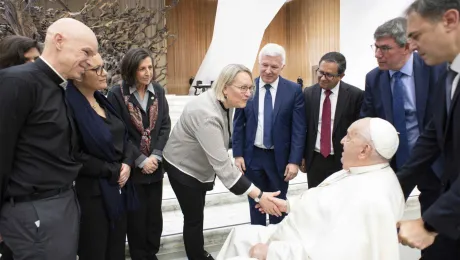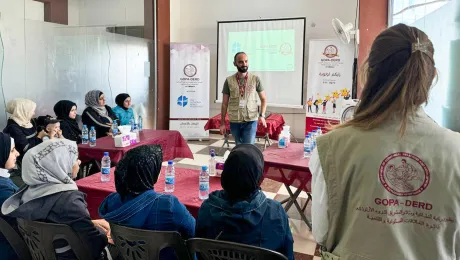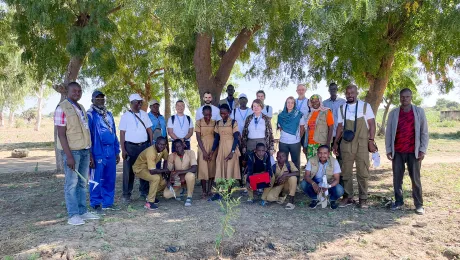Our programmatic framework
Our programmatic framework lifts up three areas of expertise in which LWF World Service already has a wealth of experience and a proven track record
Namely, it focuses on protecting and fulfilling the rights of refugees, IDPs, and returnees, as well as host and at-risk communities, to
In previous strategic periods, humanitarian, development, and advocacy approaches guided the framing of our work. In this strategy we bring our thematic expertise to the forefront. Hence, the three areas cut across the humanitarian, recovery, and development phases of our work and embed advocacy and a rights-based approach into each one. This will profile and hone our ability to meet high international standards and requirements, strengthening our position as a valuable and unique actor in the international response to displacement, poverty, and injustice.
The three programmatic areas are all framed in human rights language and are implicit rights underpinned by international human rights standards. We believe that every individual has a right to a dignified life, has a right to receive and access quality services, and has a right to live in a protective and cohesive social environment.
Our programmatic areas are all interconnected, emphasizing their complementarity and synergy, which means that one area may require the support of another area in order to reach the full effect. The right to quality services may be a precondition for resilient livelihoods interventions, for example, and there may need to be integrated with safety and protection-related measures for specific groups.
This may include creating a general feeling of safety and trust among different groupings for employment and trade and by promoting social cohesion and peaceful co-existence, as well as unrestricted mobility of goods and people. Thus, wherever we work, we look to integrate our responses across the three thematic areas, either directly or indirectly by entering into partnerships with other actors in order to complement each other’s response. This means that our projects often address a combination of programmatic areas, rather than falling solely within one.
As well as integrating the three programmatic areas whenever feasible, each one also strives to work simultaneously at three intervention levels: individual, community, and institutional. At the institutional level, there are also three dimensions: We work with duty-bearers locally, nationally, and internationally. In this way, we leverage our added value not only as an effective community-based actor, but as a global organization.
The individual level works with households or individuals, who require targeted support, services, or capacity-building to protect them from discrimination or due to special needs.
The community-level work involves preparing and empowering communities to collectively claim and defend their rights, denounce violations, and participate in finding longer term solutions. When working with communities, we actively seek to support the development of local networks and structures as a means of strengthening local civil society and to support and promote engaged and just local leadership so that our responses are sustainable. As such, we work alongside LWF member churches and other faith communities, as well as other CommunityBased Organizations (CBOs).
The institutional level, locally, is about working with and influencing local government and other duty-bearers in order to achieve improvements related to livelihoods, quality services, protection and social cohesion. Nationally, it involves playing an active role in coalitions of civil society or partnering with other private or NGO actors to influence policy and to ensure that governments and other actors implement the commitments they have made. Internationally, it involves LWF in lobbying and advocacy along with partners, including LWF member churches and broader civil society, to secure those commitments by duty-bearers on the international stage.
Across all three programmatic areas, World Service will place an emphasis on linking relief interventions with recovery and development work. In our humanitarian work, we are committed to emergency preparedness and to ensuring that our assessments and responses are relevant and appropriate. We also see how work within the context of fragile and failing states, disasters, and conflict requires complementary and concurrent action by humanitarian and development actors. Thus when states may be excluding or ignoring portions of their population, principled humanitarian action is required.
Development actors must engage early on and in a sustained way with humanitarian interventions.
World Service is well placed to bridge the humanitarian and development nexus, responding to crises quickly and building resilience from the onset of our efforts. Such an approach brings a particular added value in response to complex and protracted crises, where we can apply more development oriented, long-term solutions alongside both local and international humanitarian partners.
One of our unique strengths is to adapt to changing contexts as and when required, and to transform our responses so as to optimize the outcome of our efforts. The places where we work vary significantly, and even within individual countries local settings may fluctuate regularly. While one setting may be dominated by an emergency response environment, another setting may require recovery or development work. And a country may slide back from a situation of recovery into an emergency phase, or an emergency may become a protracted crisis if it is not resolved.
Responding to changing contexts requires conscious support for the long-term resilience of the communities we work with. Resilience benefits not only people already in crises but also people vulnerable to crises, who may be forced to co-exist with other vulnerable groups in the same affected areas.
Our initial interventions in a specific crisis situation often involve addressing immediate needs of local communities and populations in order to stabilize their situation, which helps build trust for longer term recovery and development.
Contact
Get Involved
Share with us your stories, photographs and insights using the #LWF



